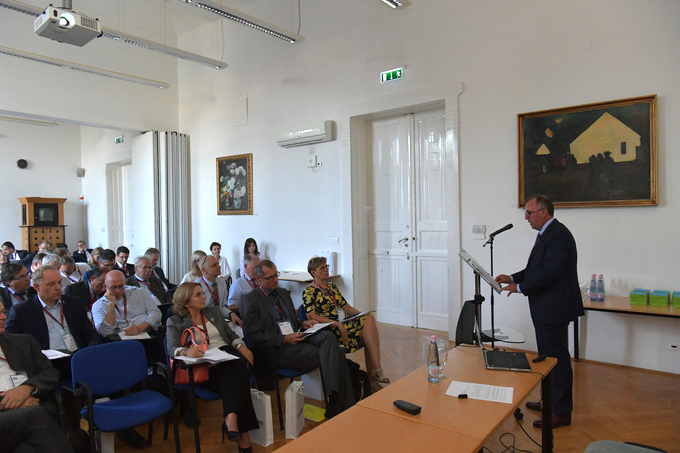2019. October 07.
BME hosts the annual meeting of the rectors of European universities of technology.
”For 38 years, this event has offered the opportunity for an exchange of views that allows a much higher level of informality than a traditional forum with a formal agenda. While the conference includes a formal part, its most important components are the unofficial, friendly conversations: it is an enormous accomplishment that we could host this year's event because we feel that all the participants benefited a great deal from it,” stressed Balázs Vince Nagy, vice-rector for international affairs, who was the main organiser of the two-day Conference of Rectors and Presidents of European Universities of Technology (CRP EUT) on behalf of the host BME, in response to bme.hu's question. He explained that the professional exchanges laid the groundwork for significant decisions, ”for example, we discussed the possibility of introducing study programmes awarding double degrees”.
|
The story of the CRP EUT began in 1980 when the rectors of the Vienna University of Technology and the RWTH Aachen University established this forum to allow the leaders of Europe's leading technology universities to consult on their professional positions, interests and the issues faced by their institutions and to consider future tasks in higher education and associated recommendations. The CRP EUT aims to jointly address global challenges, contribute to European innovation, attract more outstanding scientists to Europe from across the world, devise a strategy for international cooperation, more effectively use researcher mobility, strengthen the collaboration of participants in scientific projects and support the implementation of high gain projects. |
”It would be a huge effort to individually visit the nearly 50 university leaders, including 15 rectors, arriving at the conference and we probably would not even achieve what we do with this yearly forum,” Balázs Vince Nagy explained adding that: while websites and virtual solutions play an important but not exclusive role in disseminating information about a higher education institution, they can in no way substitute for a personal visit.” ”Our guests learned about our study programmes, research and innovation activities. Several people participating in the campus tour said that they attained a real insight into what BME's excellence means,” the vice-rector for international affairs said recalling the reactions of the guests.
Speeches at the BME-hosted forum primarily focused on the results achieved so far by the EU's HORIZON 2020 research and innovation programme, the objectives and the challenges of the upcoming HORIZON programme until 2027, researcher mobility and the possibilities for cooperation. The first day of the conference included keynote presentations while the second day featured university leaders sharing their experiences about the project and their institutional strategic perspectives for the future.
In addition to the large number of foreign speakers, the BME was represented by János Józsa, rector and Charaf Hassan, dean of the BME's Faculty of Electrical Engineering and Informatics (VIK).
Zoltán Dubéczi, secretary general of the Hungarian Rectors' Conference (MRK) was a special guest speaker and Dale A. Martin, president and CEO of Siemens Zrt, Hungary delivered a keynote speech.

„Nagyon boldog vagyok, hogy Budapesten, a Műegyetemen lehetek” – árulta el a bme.hu-nak Manfred Horvat, a Bécsi Műszaki Egyetem (Technische Universität Wien) tiszteletbeli professzora, a nemzetközi és európai kutatási és technológiai politikának, programoknak és ezek hatásvizsgálatának szakértője, aki a kezdetek óta motorja a CRP EUT szervezésének, és elkötelezett támogatója az egyetemek közötti együttműködésnek. Hozzátette, visszatért az intézménybe, mivel egy 1990-ben rendezett konferencián már járt itt: „látom a pozitív változásokat, amelyek 2004-ig, Magyarország uniós csatlakozásáig, majd azt követően történtek”. A neves szakember az EU kutatási és innovációs keretprogramjait koordináló ausztriai szervezet vezetőjeként 1993 és 2006 között arra törekedett, hogy hazánk az európai kutatói programokban egyre nagyobb szerephez jutva vehessen részt. A mostani rendezvény hasznáról azt mondta: a legjobb európai egyetemek vezetői tanulhatnak egymástól, valamint az együttműködés új lehetőségeit is megtalálhatják. „Európa sok országból, sok régióból áll, ami egyfelől potenciált jelent, másfelől a széttöredezettség kockázatát is. A konferencia több éves sikere bizonyítja, hogy a számos informális megbeszélést nyújtó találkozók szükségesek a rektorok számára az új partnerségek kialakítása céljából” – nyomatékosította az oktató-kutató.
”There are bits of information that we can easily find about each other's work, however, as leaders of universities, we also need direct exchanges of information in order to better understand the dominant trends in engineering research and education and this forum at the BME is an excellent occasion for that,” professor Christian Lerminiaux, president of Chimie ParisTech, the French head of the joint European universities EU grant with the BME, told bme.hu. He added that this decades-long series of annual conferences is an excellent opportunity to present differing opinions: the speakers may outline future perspectives, reflecting on past years.
”The key message of this conference is cooperation: to convene scientists, researchers and engineers for the common purpose of European prosperity,” said Martin Schröder, vice-president of the University of Manchester adding that university representatives may see the benefits of their scientific work in a broader context and exchange ideas with one another. ”The BME offered an excellent venue: a high-ranking, constantly developing institution in an impressive environment, which is beneficial for the entire European university community,” the professor said.
In summary of the events of the CRP EUT, Balázs Vince Nagy, vice-rector for international affairs said that interestingly, the forum of the rectors was immediately followed by a large scale international meeting in engineering education, the SEFI (European Society for Engineering Education) conference, which was also hosted by the BME. ”It was an intriguing context that the conference included speakers from universities whose rectors were our guests just days before: this instantly created common, professional points of connection, which may lay a solid groundwork for cooperation opportunities for the BME in the future.”
HA-GI
Photo: János Philip


